Following a recent instruction from the Federal Competition and Consumer Protection Commission (FCCPC), Nigeria’s rapidly expanding digital lending sector is now confronted with new challenges.
To make sure loan apps’ interest rates are not excessively or unjustly charged to customers, the Commission has said it would start observing them.
Contained in the 2025 Digital, Electronic, Online, or Non-Traditional Consumer Lending Regulations, the new rule enables the FCCPC to periodically evaluate rates and match them with consumer protection norms. The Commission claims the move is intended to stop borrowers claiming loan apps charge excessively high interest and curb growing grievances.
But digital lenders, who claim interest rates should mirror credit risk, market circumstances, and the cost of funds, have been bothered by this rule. According to Money Lenders Association president Gbemi Adelekan, capping or tightly monitoring rates could slow the industry if it lacked more inexpensive funding sources. Unlike banks, most loan applications are not deposit-taking institutions, so they have to borrow money at more exorbitant rates to cover their operations.
The News Chronicle learnt that lenders’ worries arise from the dangerous character of their customers, most of whom are people at the bottom of the income pyramid with erratic earnings. For these borrowers, repayment is unsure, which causes lenders to price loans with substantial risk premiums.
Borrowers have sometimes ended up paying practically triple the original amount across a repayment cycle, therefore fueling additional charges of exploitation.
Notwithstanding these disagreements, lenders support parts of the law aimed at lowering unethical behavior. Describing it as a good step that will push more dependence on credit agencies, Adelekan praised the prohibition on applications accessing consumers’ contacts, photos, and personal information for debt collection. He also applauded the need of openness in loan conditions, repayment plans, and interest rates.
Stakeholders in the sector like Adedeji Olowe, founder of Lendsqr, think the regulations demonstrate that digital lending is currently acknowledged as a vital component of Nigeria’s financial system. Meanwhile, violations carry severe penalties: individuals could face fines of up to N50 million; corporations risk punishments as high as N100 million or 1 percent of yearly turnover.
The FCCPC’s stronger attitude flags a clear effort to purge the industry and rebuild customer trust with over 425 registered loan applications running currently in Nigeria.



